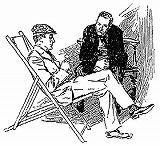“I have heard you say it is difficult for a man to have any object in daily use without leaving the impress of his individuality upon it in such a way that a trained observer might read it. Now, I have here a watch which has recently come into my possession. Would you have the kindness to let me have an opinion upon the character or habits of the late owner?”
I handed him over the watch with some slight feeling of amusement in my heart, for the test was, as I thought, an impossible one, and I intended it as a lesson against the somewhat dogmatic tone which he occasionally assumed. He balanced the watch in his hand, gazed hard at the dial, opened the back, and examined the works, first with his naked eyes and then with a powerful convex lens. I could hardly keep from smiling at his crestfallen face when he finally snapped the case to and handed it back.

“There are hardly any data,” he remarked. “The watch has been recently cleaned, which robs me of my most suggestive facts.”
“You are right,” I answered. “It was cleaned before being sent to me.” In my heart I accused my companion of putting forward a most lame and impotent excuse to cover his failure. What data could he expect from an uncleaned watch?
“Though unsatisfactory, my research has not been entirely barren,” he observed, staring up at the ceiling with dreamy, lack-lustre eyes. “Subject to your correction, I should judge that the watch belonged to your elder brother, who inherited it from your father.”
“That you gather, no doubt, from the H. W. upon the back?”
“Quite so. The W. suggests your own name. The date of the watch is nearly fifty years back, and the initials are as old as the watch: so it was made for the last generation. Jewellery usually descends to the eldest son, and he is most likely to have the same name as the father. Your father has, if I remember right, been dead many years. It has, therefore, been in the hands of your eldest brother.”
“Right, so far,” said I. “Anything else?”
“He was a man of untidy habits - very untidy and careless. He was left with good prospects, but he threw away his chances, lived for some time in poverty with occasional short intervals of prosperity, and finally, taking to drink, he died. That is all I can gather.”
I sprang from my chair and limped impatiently about the room with considerable bitterness in my heart.
“This is unworthy of you, Holmes,” I said. “I could not have believed that you would have descended to this. You have made inquiries into the history of my unhappy brother, and you now pretend to deduce this knowledge in some fanciful way. You cannot expect me to believe that you have read all this from his old watch! It is unkind and, to speak plainly, has a touch of charlatanism in it.”
“My dear doctor,” said he kindly, “pray accept my apologies. Viewing the matter as an abstract problem, I had forgotten how personal and painful a thing it might be to you. I assure you, however, that I never even knew that you had a brother until you handed me the watch.”
“Then how in the name of all that is wonderful did you get these facts? They are absolutely correct in every particular.”
“Ah, that is good luck. I could only say what was the balance of probability. I did not at all expect to be so accurate.”
“But it was not mere guesswork?”